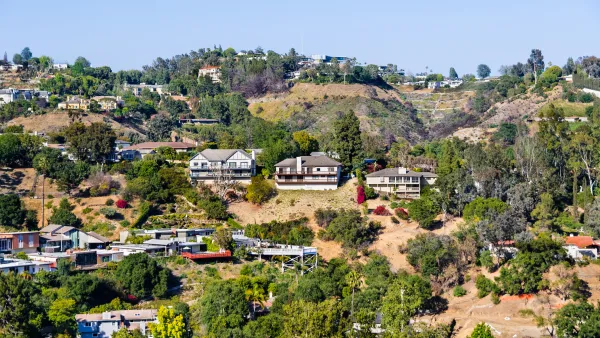American reliance on property taxes leads to NIMBYism and periodic tax revolts, thus impeding both development and basic public services.
A recent article in the Economist suggests that property taxes are more pro-growth than other taxes, because property taxes are more stable than other sources of revenue. Even assuming this is the case, property taxes have a variety of negative side effects that the article fails to consider.
Property taxes promote NIMBY (Not In My Back Yard) resistance to new housing. If a housing development is unusually affordable, the housing will produce less property tax revenue than the rest of the housing stock. Thus, the housing will (compared to more expensive housing) reduce the municipal tax base- which means higher taxes or fewer services for existing taxpayers. In such a situation, the municipality's residents have an excellent reason to oppose the development..
But what if a proposed housing development is more expensive than nearby housing? The new development may make all of the city or neighborhood's housing more valuable, thus causing the municipality to force everyone to pay more taxes. Such a revaluation may be good news for neighbors who wish to sell out- but bad news for other neighbors who will have to pay higher taxes to stay in their homes. Thus, neighbors may rationally oppose the expensive housing as well, fearing that the new housing will cause them to be forced out of their homes by higher property taxes.
It follows that municipal reliance on property taxes leads to high levels of NIMBYism, which means less housing would get built than would otherwise be the case, which in turn leads to out-of-control housing prices.
In addition, property taxes tend to be extremely unpopular because they are often assessed in a lump sum (as the Economist article admits). So a city dependent on property taxes is likely to have its revenues periodically reduced by tax revolts. State-level politicians in particular have an incentive to buy votes by promising to reduce local property taxes, because if a city is forced to reduce services as a result, mayors rather than governors will suffer at the polls. Is this a good thing? I think not, because when one level of government makes decisions that another level can be blamed for, the public accountability that democracy rests upon is eroded. Moreover, the public services provided by municipalities include the most obviously "basic" such as fire and police- so when state government tampers with municipal services, it tampers with public order.

National Parks Layoffs Will Cause Communities to Lose Billions
Thousands of essential park workers were laid off this week, just before the busy spring break season.

Retro-silient?: America’s First “Eco-burb,” The Woodlands Turns 50
A master-planned community north of Houston offers lessons on green infrastructure and resilient design, but falls short of its founder’s lofty affordability and walkability goals.

Delivering for America Plan Will Downgrade Mail Service in at Least 49.5 Percent of Zip Codes
Republican and Democrat lawmakers criticize the plan for its disproportionate negative impact on rural communities.

Test News Post 1
This is a summary

Test News Headline 46
Test for the image on the front page.

Balancing Bombs and Butterflies: How the National Guard Protects a Rare Species
The National Guard at Fort Indiantown Gap uses GIS technology and land management strategies to balance military training with conservation efforts, ensuring the survival of the rare eastern regal fritillary butterfly.
Urban Design for Planners 1: Software Tools
This six-course series explores essential urban design concepts using open source software and equips planners with the tools they need to participate fully in the urban design process.
Planning for Universal Design
Learn the tools for implementing Universal Design in planning regulations.
EMC Planning Group, Inc.
Planetizen
Planetizen
Mpact (formerly Rail~Volution)
Great Falls Development Authority, Inc.
HUDs Office of Policy Development and Research
NYU Wagner Graduate School of Public Service






























